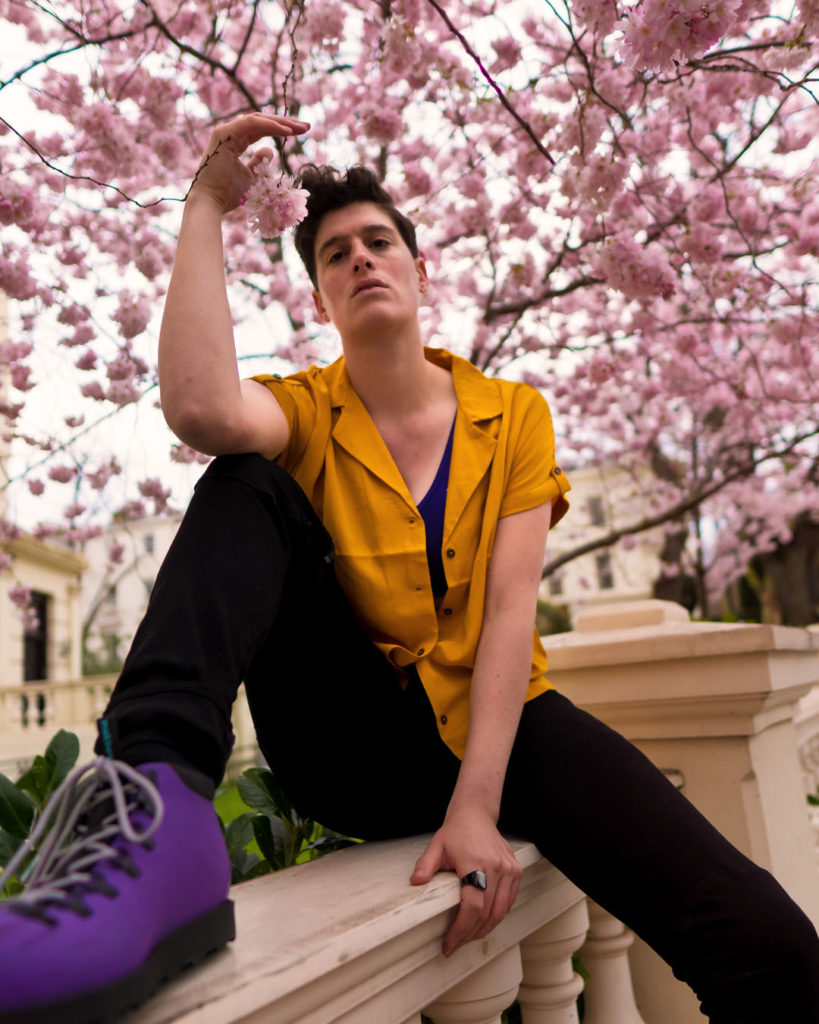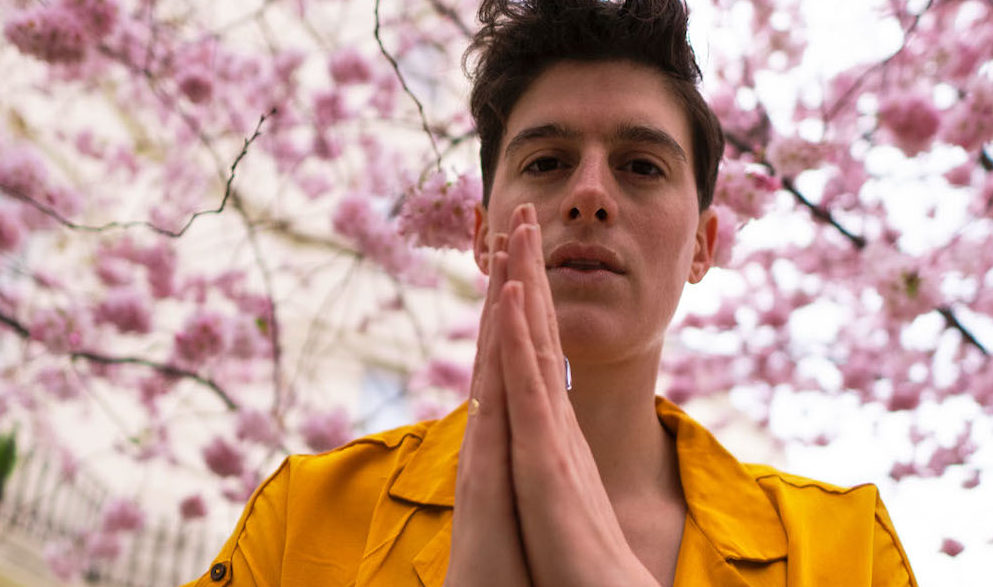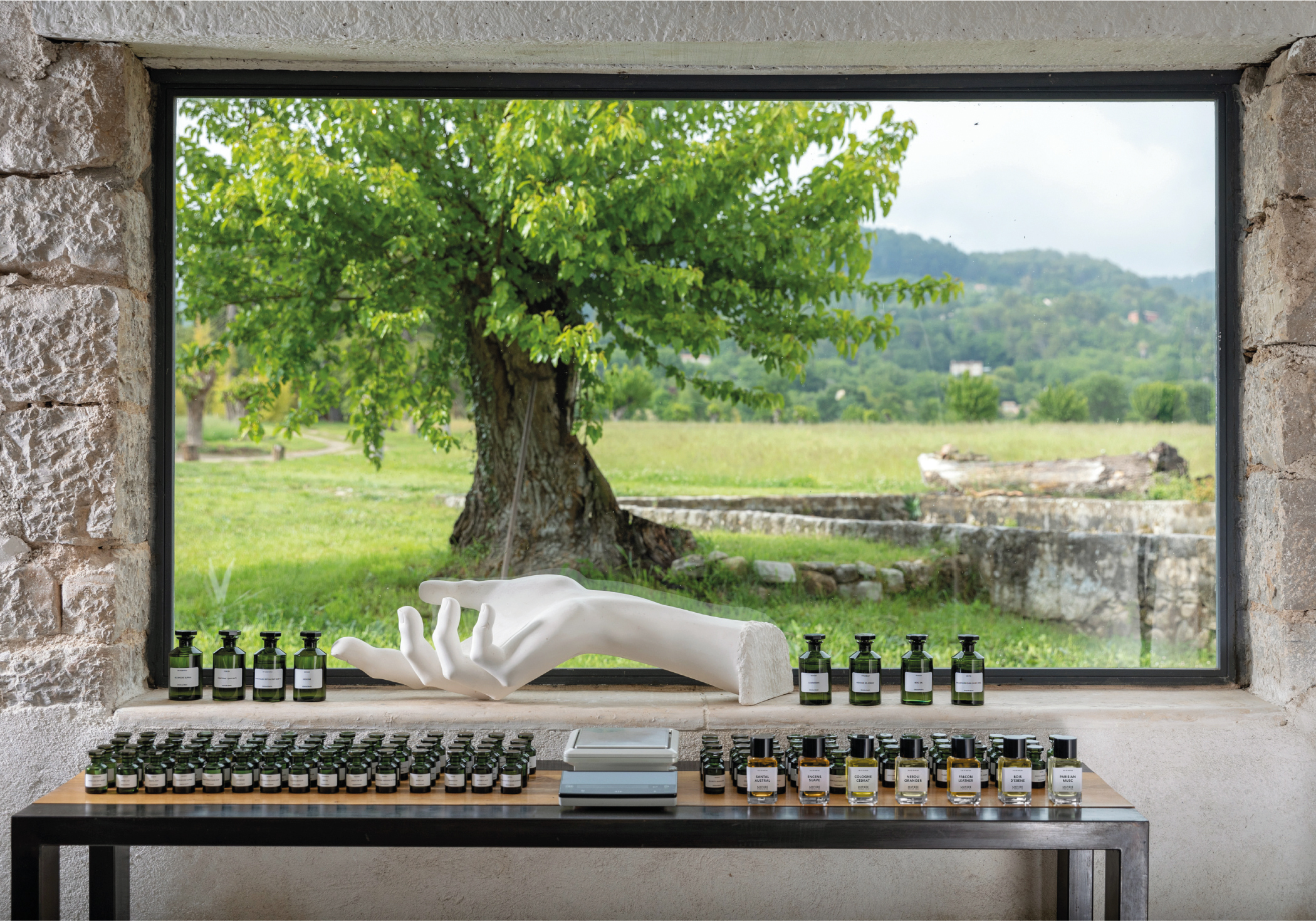“Every time I work with a corporation I have to think about what it means—are they just using diversity as an opportunity to get people to feel like it’s activism to buy things. I always have to think about whether I’m being used in order for a company to gain power.”
This sentiment, shared by gender non-conforming model Rain Dove, speaks volumes about consumer culture, and the left-wing agendas that are so often co-opted as corporate buzzwords. For the 30-year-old activist, the message always comes first. Reaching a community of over 400K people on Instagram, Rain Dove—who identifies as “I”, and doesn’t care what pronouns you use for her/him/them—uses social media openly and without reservation, engaging with the personal, heartbreaking and at many times hateful messages people submit through DMs. Responding to hate with love, and anger with compassion, Rain Dove is a master of the “kill ’em with kindness” approach, and many times—it works. “I understand that for the kind of equality I want, I need to look everybody in the eye and say you deserve to be here. You deserve food, shelter, water, physical safety, freedom of movement,” they say. “It is easy for me to be patient when I understand that what we’re looking for is just a better future.”
For Transgender Day of Visibility, Rain Dove teamed up with Zalando to spread the message of activism and equality. In light of the collaboration, we caught up with the self-professed “gender capitalist” to talk hope, hate and harnessing the power of social media.

You call yourself a gender capitalist, what do you mean by that?
A ‘Gender Capitalist’ is a tongue in cheek term. It refers to a person who understands that they can capitalise on being perceived as ‘male’ or ‘female’ by societal standards. For instance, perhaps being perceived as a ‘female’ will get You free entry into a club. However, being perceived as a ‘male’ will allow You a better chance of getting home safely. I used to live a life like this- and it led to the career I have today. I’m paid to be perceived as all, neither or either genders. Eventually though I became exhausted trying to be whatever I thought anyone wanted me to be in order to get the best from them. I wanted the best for being myself. So- now I continue to call myself a Gender Capitalist because it upsets people. It gives me the opportunity to say ‘Yes. It should upset you. 100%. This isn’t fair.’
‘Coming of age’ is such a formative part of life that it’s become its own genre, but it’s something that is so often romanticised by film and TV. How was this period of time for you?
I grew up in a puritanical community—a small farming environment where people prided themselves on doing things simply. Who I was and how I felt inside was far too complex for these people. I had limited access to TV; magazines were luxuries we didn’t buy; and all music played was folk or country. There was no one to relate to. It was a drowning experience. Seemingly there was no language to describe who I was, though I constantly sought it. So for many years, I existed outside my truth. I existed in silence.
You closed yourself off?
I didn’t want to be a burden to my parents, so I hid who I was from them. Going through the motions everyday to reflect the version of myself I thought they wanted me to be. My friends were religious individuals, only one of whom I shared my truth with. It backfired when they outed me out of shame.
View this post on Instagram
You’re incredibly open on social media and it feels as though you use your Instagram to interact with people first and foremost, in a very different way to how many other models use the platform. What made you want to harness the power of social media in this way?
Social media is something I never knew could be positive until it became a platform. I originally had Facebook and Instagram simply to communicate with people back at home. I was very transient at the time and I remember feeling jaded at all the people showing off their bikini bodies, perfect vacations, and flawless makeup routines. It felt pointless—as if I was scrolling through a magazine filled with advertisements. But then one day, Buzzfeed wrote an article about me that went viral. My Instagram gained 10k supporters in 24 hours. Suddenly, designers wanted to work with me, people wanted to cast me, people wanted to interview me. Me me me. My life took a turn and there was a giant spotlight. I got a bit of a big head in the beginning—did the things I thought I was supposed to do to maintain the spotlight because for the first time I was making money. For the first time I could afford a home. For the first time I could send funds back home to support my family. I tied my internet fame into my survival tightly.
When did that change?
A few months into all of the new buzz, I began to read DMs that were coming in. People started to express that they were in small communities. In places where being themselves was illegal. In places where they felt invisible. It was this day of message reading that I realised, I was not doing right by the people who had gifted me this platform. I was ashamed. So I sat down, recalibrated, and vowed to commit this platform to being the person I wish I had had growing up. I was not a saviour or better than anyone. I was simply a person who had a choice. To be of service, or to be empty. Since then it’s been the most satisfying path I could’ve ever dreamed of achieving.
View this post on Instagram
Your interactions are so kind, especially with people whose views many would find hard not to shut down immediately—closed minded, sometimes even aggressive. How do you stay so patient and empathetic?
It’s not easy to control rage. So I don’t try. However, it is easy to control actions. Doing so can save lives. I just think of You. I think of the fact that people are the heroes of their own stories. Almost everyone, even when they know they are hurting someone, they still feel justified in some way. We are all complex beings, but that doesn’t mean we aren’t able to be understood. We need rage—it drives action and activism—yet if we truly want equality and peace to occur, we MUST focus on the end goal. What do we actually want? Do we want a world where all people are included? Do we want a world where all people have access to food/shelter/water/safety? If so then this means looking Your opposition in the eye and allowing Yourself to say ‘You deserve food/shelter/water/safety too.’ For this, we need daring diplomats. People who work to educate despite hate. (We can be compassionate without giving permission to someone to continue their actions.) We need many forms of existence all working towards the ultimate goal of unity. Many tools to grow a garden.
By responding to hatred and trolling with kindness and compassion, you often seem to actually change people’s mindset—when did you first begin to realise that this type of kindness was so powerful?
My first realisation that kindness can trump hate occurred with a Trump supporter: My father. For years we raged at each other. When my parents divorced, I distanced myself from him, and he from me as well. I saw him as sexist, homophobic, racist, alcoholic—everything under the sun. Years after being out on my own in the world I returned, I felt a greater sense of inner peace. Visiting, I prepared myself for an inevitable fight. But when I was in their home I took a moment to look at their life. It was tough. My father was low income, felt forgotten, barns in the community had collapsed with the economy. The local drug market had decimated the youth and grass grew in the cracked pavement which ran down the busiest street in the nearest city. It was that moment, after having lived primitively myself, which I realised that their lashing out at the world was a reflection of the fact that they felt the world didn’t care about him. So why care about us. For that trip, I just stayed silent. I did chores, asked him about his crafts and hobbies, allowed him to show off the things he was proud of. Then over whiskey, I showed off my partner. Who I was proud of. I was firm that it was who I was, but explained my identity in detail as lovingly as possible. For the first time, he didn’t yell. He simply clinked my glass and said ‘To each their own.’ A year later, he asked my advice about a student who was trans in class. He expressed that he wanted to help them because they were being bullied. It was one of the proudest moments of my life.
View this post on Instagram
You recently teamed up with Zalando for trans visibility day, can you tell me a bit more about that collaboration?
My first collaboration with Zalando occurred for their FREE TO BE campaign this past fall- as with any corporation that reaches out about a diversity driven campaign at first I was wary. However, my experience with the creative & marketing team was unlike anything I had experienced before. They listened, focused on our actual voices vs sales, and they followed up after the campaign to check in. I’m still great friends with many of the people from set. We made not just a campaign during those two weeks of shooting- but also a family. Since then, various members of Zalando staff have checked in about ways they can continue their message of inclusivity.
That’s where Mario comes in. He reached out about doing this campaign and I was so excited to support the message everywhere possible. He even listened to suggestions for other trans talent- many whom they had already hired from the list I sent over. But the story hit a difficult moment, when COVID19 caused a complete global shutdown of work and movement. Activists and artists saw their work disappear instantly. Zalando ran into some shipping conflicts as some brands couldn’t provide items due to their productions being paused with lockdown. Yet- despite what seemed like every brand cancelling on jobs- Zalando decided to go through with the campaign. I wrote them a long letter telling them how much it meant for Trans and queer peopple to see support from unexpected sources during the vulnerable process of lockdown. When the campaign went up, the DM’s and comments reflected that impact. People even sent videos crying- it was beautiful.
I’m very proud of this campaign- and very proud that Zalando once again did not say ‘BUY OUR STUFF’. They simply said, these are the people we love. That’s why I think Zalando is worth loving too.
One interaction you posted recently was one between you and a parent, do you get that a lot?
Yes. Surprisingly a LOT. Sometimes I get people who even just pose as their parents to get an idea of how to talk to them by seeing how I respond. Sometimes I just get people who aren’t interested in dialogue. They are just getting off on being volatile. But, parents with the traction I’ve gotten, have come to me for advice. Sometimes not always in the most gentle way haha. I think they approach because they know they can come as they are.
View this post on Instagram
Being under lockdown can put extra strain on relationships, but family relationships are perhaps some of the most difficult to manoeuvre, what’s your advice to people who are struggling in a family setting right now?
Quarantine is a time that is especially vulnerable for many—we end up going inward because we literally can’t go out. Often, we have friends who get us for the who we are. But whether You have a parent or You have a child to consider, it is natural to feel moderately obligated to be performative in front of Your family, because You are all in a survival situation together—it’s very primal. It’s important for parents to realise their kids may be at a higher risk for self harm and suicide as self isolation can lend to mental health obstacles. As much as it may hurt, give Your child a safe space to talk to their friends. Give them a safe space to talk to You. Give them a safe space to ask anything, even if they know it may hurt Your feelings.
Kids, Your parents should accept You for who You are. You should be able to exist in a safe space. Sometimes though, we don’t always have that luxury. Prioritise Your safety first. Always. There is no time limit to tell anyone who You are or how You identify. Should You decide to, understand that this is not a ‘confession’, it’s a positive thing. Remember that You’ve had a long while to process who You are and how You identify. For parents, they might need a moment to process. It’s natural for them to need that moment—it’s their job to protect You. With media and social brainwashing constantly displaying that it’s dangerous for us to be free—they may need to recalibrate. Just be consistent, persistent love.
There’s a reason that the terms ‘stir crazy’ and ‘cabin fever’ exist—quarantine type situations can often be taxing on mental health, what are your tips for staying calm, grounded and connected during this time?
Many people are having to face themselves during quarantine—they are kept in one place, processing their self and mental health. It’s scary! It’s perfectly natural to fall into various waves of depression or frustration as we spend more time in lockdown. What makes it worse is that a lot of people are saying, ‘Just exercise! Just eat healthy! Just use this time to read a book! Just be grateful!’ But it’s hard to do that when we feel down—and when we can’t do these ‘simple’ things, we feel even worse. So, instead of trying to make Yourself feel better, embrace the emotions. Go DEEP. Feel the feels! Make an emo playlist of the saddest music, intentionally watch the saddest movies, set out sweat pants and intentionally wear them two days in a row. Do it. Go for it. 100% all in. The Feels. What causes depression is lack of control in the chaos. If You make an environment to embrace devastation, it’s one thing that’s being controlled. It’s as if You are giving Yourself permission to feel down. Which helps You feel like it’s easier to get up. Sometimes being sad is necessary—and it can be ironically fun. Happiness isn’t the only positive emotion.


